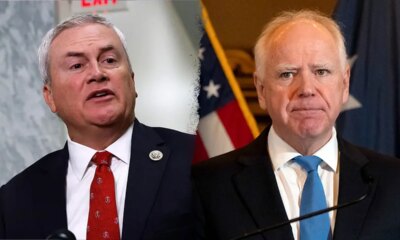Louisiana
Louisiana legislators grill New Orleans DA for releasing people convicted of violent crimes

BATON ROUGE, La. — Louisiana legislators interrogated New Orleans District Attorney Jason Williams over reform policies that have allowed several hundred people to have their convictions voided or sentences reduced in the past few years, during a fiery Senate hearing Thursday at the state capitol.
Conservative lawmakers, Republican Attorney General Liz Murrill and several former prosecutors said Williams failed to fulfill his duty to defend convictions for violent crimes. They highlighted cases of convicted murderers and rapists released from prison through post-conviction relief, which allows new information to be considered after all appeals have been exhausted.
Williams, a Democrat who took office in 2020 on a progressive platform, defended his record and said his office is seeking to restore trust in the legal system. He has pushed for expanding the use of post-conviction relief to review cases where his office believes unconstitutional or unjust procedures were employed to reach convictions.
Murrill said she is reviewing what she called the “disproportionately higher number” of relief cases awarded by Williams’ office since January. He has granted relief in around 40 cases during that period, while district attorneys in neighboring Jefferson and St. Tammany parishes have only allowed for one case of relief each.
In almost every case granted by Williams’ office, the person had not asserted their innocence as a reason for relief, she said. District attorneys have an obligation to fight to uphold convictions, Murrill added.
Williams and his supporters have pointed to New Orleans’ history of police and prosecutorial misconduct and harsh sentencing policies as a reason for the elevated number of cases.
“The job is to enforce the law and not make the law,” Murrill said. “If the district attorney had a disagreement regarding policy, that’s not a basis for relief.”
Under a new law that took effect in August, Williams’ office is required to notify the attorney general of post-conviction relief cases and allow her to intervene.
Murrill and conservative lawmakers said the hearing was part of a process to assess whether Williams had committed overreach. They would consider additional legislative responses to his office’s actions in the future. Across the country, conservative legislators have sought to limit the independence of progressive prosecutors, according to University of Berkeley law professor Rebecca Goldstein.
State Sen. Royce Duplessis, a Democrat who represents New Orleans, said that Williams reflected the values and policies of voters who elected him to office and questioned the political motives behind the hearing.
Laura Rodrigue, a former New Orleans prosecutor and daughter of Williams’ predecessor, highlighted what she said was a flurry of instances where post-conviction relief was granted despite there being “no legal basis” for relief.
She raised the case of Eric Matthews, who beat his two-year-old to death with a belt in 1994 and had his conviction voided earlier this year on the grounds that his lawyer was ineffective. While Williams’ office said they opposed releasing Matthews and plan for a retrial, Matthews is currently out on bond.
“Finding some loophole to let someone out on, none of us should support that because it is evil, it is wicked,” Republican state Sen. Valarie Hodges said.
Republican state Sen. Jay Morris brought up the case of another man who stabbed his female partner to death and was later re-sentenced and released after Williams’ office conceded the ineffective counsel claims presented by the man’s attorney.
“Do you have a concern that that person who brutally murdered his ex-wife (is) being set free?” Morris asked Williams.
Williams said he did. But he explained there were other potential constitutional violations raised in the case and that acknowledging them could have “exposed my office to a lawsuit.”
He said his office had sought maintain a conviction and had shared statements from the victim’s family to the judge opposing the release.
Williams said he believed much of the testimony presented at the hearing was misleading and unfairly maligned the post-conviction relief process. He said his office was motivated to let people have a chance to bring new evidence into court, pointing to a case where one alleged victim recently admitted that he had falsely accused a man serving decades behind bars for armed robbery.
Some lawmakers accused Williams of operating without transparency over his decision-making in cases where relief was granted. His office has withheld documents from the public related to these cases on the grounds they are protected “work product,” the Advocate has reported.
Williams said his office plans to provide lawmakers and the attorney general with complete records for each case of post-conviction relief over the past year.
“We have nothing to hide,” he said.
___
Brook is a corps member for The Associated Press/Report for America Statehouse News Initiative. Report for America is a nonprofit national service program that places journalists in local newsrooms to report on undercovered issues. Follow Brook on the social platform X: @jack_brook96.

Louisiana
Louisiana has the highest incidence of prostate cancer in the nation. See the parish data.

Prostate cancer is the most common cancer in American men, with an estimated 333,830 new cases and 36,320 deaths projected for 2026 for the disease, according to the American Cancer Society.
In the U.S., there are approximately 116 new prostate cancer cases per 100,000 people annually. Louisiana has the highest prostate cancer incidence rate in the country at 147.2 cases per 100,000 — a rate that has been steadily rising since 2014, according to data from the National Cancer Institute.
New prostate cancer drug can extend life expectancy by 8 months, Baton Rouge doctor says
These parishes had the highest rates, in cases per 100,000, of prostate cancer from 2018 to 2022, in descending order:
- West Feliciana Parish with 218.6 cases per 100,000;
- Iberville Parish with 182.3 cases per 100,000;
- Bienville Parish with 179.7 cases per 100,000;
- West Baton Rouge Parish with 179.4 cases per 100,000;
- Vermillion Parish with 176.5 cases per 100,000;
- Iberia Parish with 173.8 cases per 100,000;
- East Baton Rouge Parish with 173.6 cases per 100,000;
- East Carroll Parish with 172.9 cases per 100,000;
- East Feliciana Parish with 166.3 cases per 100,000;
- Tangipahoa Parish with 166.2 cases per 100,000;
- St. Martin Parish with 166 cases per 100,000;
- Jackson Parish with 165.3 cases per 100,000;
- and Lincoln Parish with 165.1 cases per 100,000.
These parishes had the lowest rates, in cases per 100,000, of prostate cancer from 2018 to 2022, in ascending order:
- Cameron Parish with 101 cases per 100,000;
- Evangeline Parish with 102.7 cases per 100,000;
- Union Parish with 106.9 cases per 100,000;
- Winn Parish with 108.2 cases per 100,000;
- Vernon Parish with 109.4 cases per 100,000;
- Grant Parish with 109.7 cases per 100,000;
- Franklin and La Salle parishes with 111 cases per 100,000;
- St. Bernard Parish with 113.9 cases per 100,000;
- Tensas Parish with 115.2 cases per 100,000;
- Terrebonne Parish with 117.5 cases per 100,000;
- Washington Parish with 121.1 cases per 100,000;
- Livingston Parish with 122.8 cases per 100,000;
- Sabine Parish with 122.9 cases per 100,000;
- Bossier Parish with 123.7 cases per 100,000;
- and La Fourche Parish with 124.8 cases per 100,000.
Data represents an annual average for all stages of prostate cancer.
Louisiana
Shavers leads ULM past Louisiana 79-63

PENSACOLA, Fla. — Marcavia Shavers posts 21 points and 13 rebounds to lead ULM Warhawks women’s basketball past Louisiana 79-63 in the Sun Belt Conference tournament.
ULM (15-15, 7-11 Sun Belt) took control early, outscoring Louisiana 17-7 in the first quarter and extending the lead to 41-21 by halftime. The Warhawks never trailed and led by as many as 28 points in the second quarter.
Shavers anchored the inside for ULM, finishing 9-of-15 from the field with 13 rebounds. Jazmine Jackson added 17 points off the bench, knocking down four 3-pointers, while J’Mani Ingram scored 16 points and dished out six assists.
ULM shot 46.9% from the field and held a 42-27 advantage on the boards. The Warhawks also converted Louisiana turnovers into 29 points and scored 26 second-chance points.
Louisiana (5-26, 2-16 Sun Belt) was led by Mikaylah Manley with 18 points and Imani Daniel with 17 points and seven rebounds. Amijah Price chipped in 12 points.
After struggling early, Louisiana shot better in the second half, scoring 42 points after the break. However, the early deficit proved too much to overcome.
ULM advances in the Sun Belt tournament, while Louisiana closes its season with the loss.
————————————————————
Stay in touch with us anytime, anywhere.
To reach the newsroom or report a typo/correction, click HERE.
Sign up for newsletters emailed to your inbox. Select from these options: Breaking News, Evening News Headlines, Latest COVID-19 Headlines, Morning News Headlines, Special Offers
Like us on Facebook
Follow us on Instagram
Subscribe to our Youtube channel
Louisiana
State Treasurer John Fleming accuses Jeff Landry of interfering in Louisiana Senate race

BATON ROUGE (KNOE) – Louisiana State Treasurer John Fleming is accusing Governor Jeff Landry of interfering with the state Senate race, which Fleming is a part of.
Fleming took to social media to accuse Landry of working “behind the scenes” to get Congresswoman Julia Letlow elected to the Senate.
According to Fleming, Dr. Ralph Abraham offered him the position of Deputy Director of the CDC shortly before announcing he was stepping down. Fleming said he politely declined.
A week later, news broke that Abraham is now leading Letlow’s Senate campaign.
“We know that Jeff has been heavily lobbying the Trump campaign team for the endorsement, he is pressuring the Republican Party of Louisiana and the Republican Executive Committees to support and endorse Letlow as well,” Fleming wrote on Facebook. “And, he is personally calling his donors to raise big money to save the Letlow campaign.
Landry formally endorsed Letlow for the U.S. Senate on March 4. Letlow also has the endorsement of President Donald Trump.
“We need a warrior who stands with the President to Make America Great. And there’s no greater warrior than a Louisiana mom,” Landry wrote on Facebook.
Fleming continued his commentary, asking when Landry will stop interfering with the state’s Senate race.
“Who is best to decide who represents you in Washington? Jeff Landry, or YOU?” Fleming asked.
Also in the heated race is incumbent Bill Cassidy, M.D.
Party primary elections in Louisiana are set for May 16, 2026.
Copyright 2026 KNOE. All rights reserved.
-

 World1 week ago
World1 week agoExclusive: DeepSeek withholds latest AI model from US chipmakers including Nvidia, sources say
-

 Wisconsin4 days ago
Wisconsin4 days agoSetting sail on iceboats across a frozen lake in Wisconsin
-

 Massachusetts1 week ago
Massachusetts1 week agoMother and daughter injured in Taunton house explosion
-

 Maryland5 days ago
Maryland5 days agoAM showers Sunday in Maryland
-

 Massachusetts3 days ago
Massachusetts3 days agoMassachusetts man awaits word from family in Iran after attacks
-

 Florida5 days ago
Florida5 days agoFlorida man rescued after being stuck in shoulder-deep mud for days
-

 Denver, CO1 week ago
Denver, CO1 week ago10 acres charred, 5 injured in Thornton grass fire, evacuation orders lifted
-

 Oregon6 days ago
Oregon6 days ago2026 OSAA Oregon Wrestling State Championship Results And Brackets – FloWrestling





















